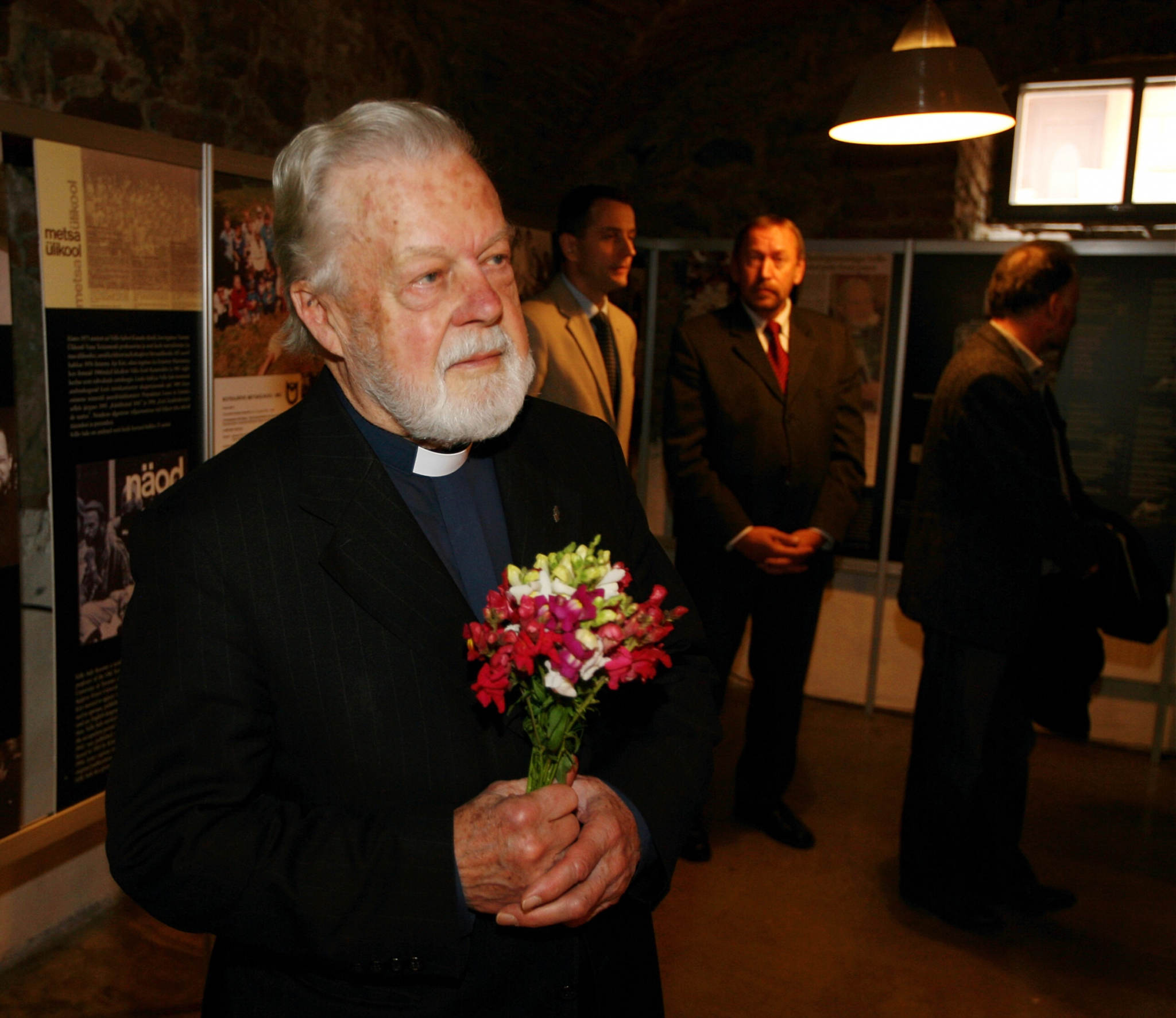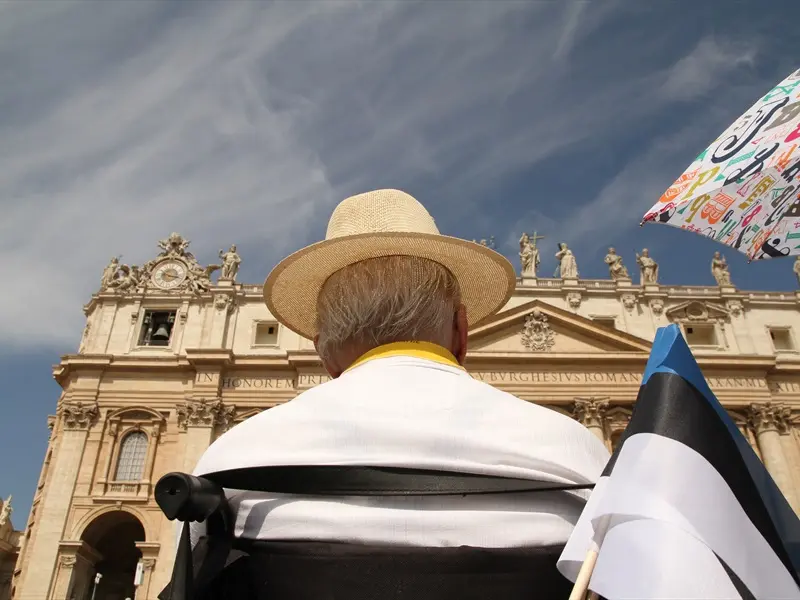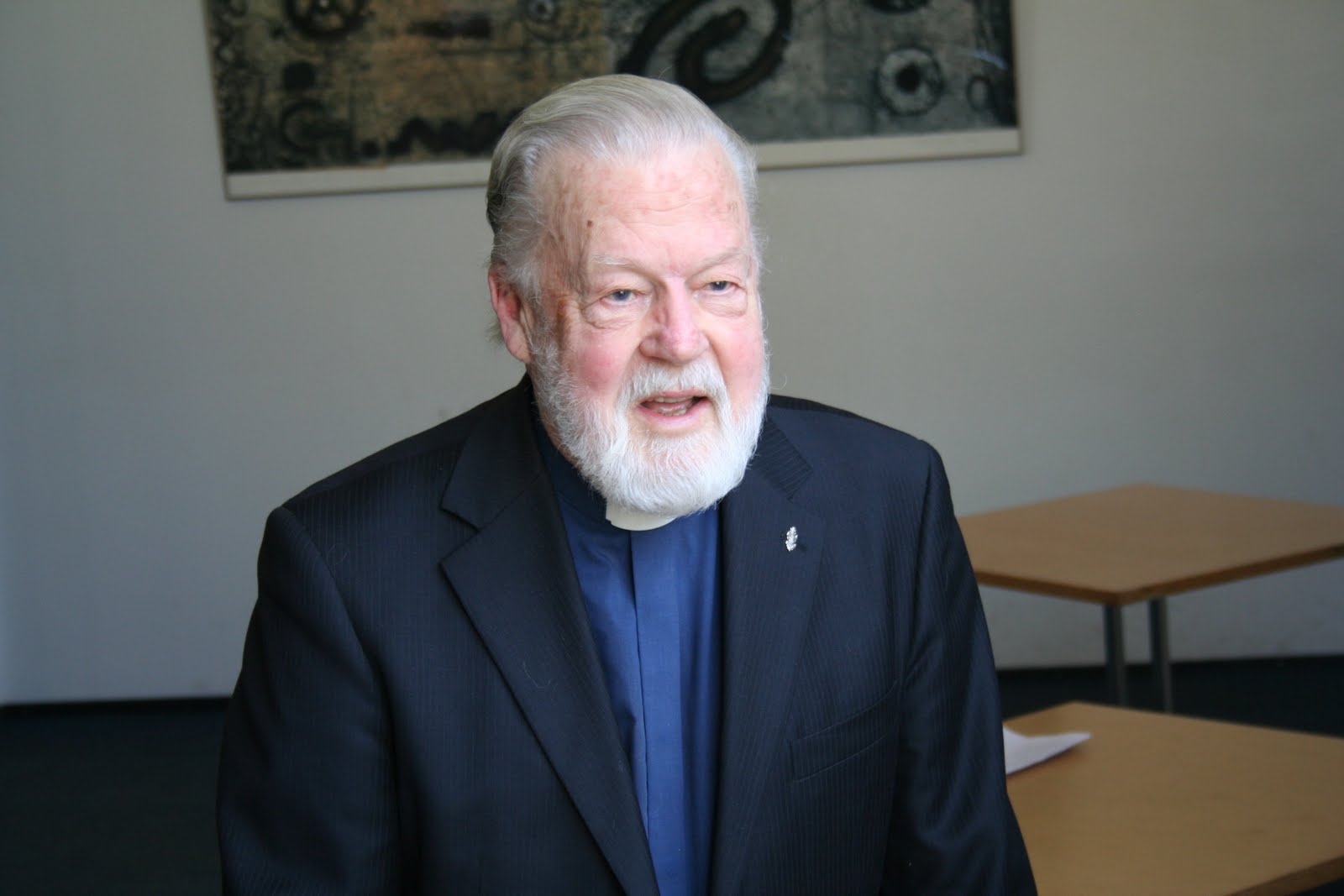His story, largely unfamiliar outside religious and literary circles, offers a fascinating window into the Estonian diaspora’s resilience and the power of one man’s devotion to homeland and heritage.
From Viljandi to the Vatican: An Unlikely Journey Begins
Born Endel Vaher in 1925 in Viljandi County, Estonia, Salo came of age just as World War II engulfed his country. In 1943, while still in secondary school, he volunteered for the Finnish Army – becoming one of the famed “Finnish boys” (Estonians who fought with Finland against the Soviets). The following year, he returned to Estonia hoping to resist the advancing Red Army, only to be captured by retreating German forces and sent to a POW camp in Germany. Amid the chaos of war’s end, Vaher fought in Silesia and survived the harrowing “Czech Hell” prisoner camp, eventually escaping to Italy in 1945. To protect his family back in Soviet-occupied Estonia from reprisals, he assumed a new identity – Vello Salo – and thus began a life in exile.

Settling in Rome, the young exile pursued an education that was as eclectic as his journey. Salo studied mathematics and physics in Switzerland and the Netherlands in the late 1940s, then pivoted to theology and philosophy in Italy. By 1951 he had earned a Licentiate in Philosophy, and he went on to attain advanced degrees in theology and biblical studies. In Italy, the former soldier also found his spiritual calling. He was ordained a Catholic priest in 1957 in Germany and joined the ranks of the clergy – an unusual path for an Estonian, as most of his countrymen were traditionally Lutheran or secular. But Salo’s faith became deeply intertwined with his patriotism. From 1948 to 1953, he worked with Vatican Radio, helping broadcast news and scripture in Estonian. These clandestine Estonian-language broadcasts from the Vatican provided a lifeline of truth and hope to those behind the Iron Curtain and showed Salo’s early commitment to serving his people even from afar.
A Scholar–Publisher Keeping Estonian Culture Alive in Exile
As the Iron Curtain fell across his homeland, Salo emerged as a key figure in preserving Estonian culture and memory abroad. In 1962, while still in Rome, he founded the Maarjamaa exile publishing house, which would go on to publish over 50 works during the Soviet decades. Through Maarjamaa Press, Salo produced books on Estonian history, literature, and religion that could not be freely printed in occupied Estonia. He also co-compiled research on the tragic losses Estonia suffered under Soviet and Nazi regimes, documenting deportations and political repressions. This included contributing to the landmark White Book that tallied the human cost of those occupations – a project vital to Estonia’s historical memory.
Fluent in many tongues (he reportedly picked up 16 languages over his lifetime), Salo became a cultural bridge between Estonia and the wider world. He translated prominent Estonian poets into Italian, introducing authors like Juhan Liiv and Viivi Luik to Mediterranean audiences. Conversely, he brought spiritual literature to Estonian readers by translating religious poetry and biblical texts into Estonian from the ancient originals. In an era when Soviet censors tried to erase national identity, Salo’s pen quietly ensured Estonia’s literary voice was heard and its spiritual traditions endured. “Promoter of Estonian literature in exile” is how one literary encyclopedia aptly describes him. Whether through printing presses or radio waves, Father Salo’s work always carried a dual purpose: nurturing the soul and safeguarding the cultural memory of his homeland.
His travels for study and ministry took him across Europe and beyond. In the 1960s, Salo even spent several years as a professor at a Chaldean Catholic seminary in Mosul, Iraq – an early indication of his truly global perspective. By the mid-1970s, with a doctorate in theology earned in Rome, this peripatetic priest-scholar was ready to embark on a new chapter across the Atlantic, in the thriving Estonian expatriate community of Canada.

North America Calling: A Professor and Community Mentor in Toronto
In 1976, Vello Salo arrived in Toronto, which was home to one of the largest Estonian diaspora communities in the West. He would spend the next 15 years there, leaving an indelible mark on Estonian cultural life in North America. Salo joined the University of Toronto as a professor, teaching Old Testament and theology, and almost immediately also began offering Estonian language classes on campus. At a time when immigrant families were eager to have their Canadian-born children retain the mother tongue, Salo’s courses – though non-credit – were pioneering. He effectively laid the foundation for formal Estonian studies in Toronto, a tradition that continues to this day. Under his guidance, countless young Estonian-Canadians learned to read and write in Estonian, ensuring the language would not wither in foreign soil.
Beyond the university halls, Father Salo became a beloved mentor and intellectual in the broader community. Each summer, he ventured into the woods of Ontario to teach at Kotkajärve Metsaülikool – the “Forest University” summer camp for Estonian youth. From 1974 all the way until 2004, he was a fixture at these rustic retreats, delivering lectures on history, literature, religion, and heritage around campfires. Generations of diaspora Estonians recall Father Salo’s gentle humor and wisdom amid the pines, as he helped instill pride in their roots. “He had gathered and preserved wisdom to this modern day,” one documentary noted of Salo, highlighting his broad-minded spirit and personal quirks that made learning from him a joy. Whether in a forest clearing or a downtown classroom, his message was consistent: being Estonian was something to cherish, nurture, and never abandon.
Salo also lent his expertise to diaspora media and scholarly circles. In Toronto he edited an intellectually vibrant Estonian expatriate journal in the late 1970s, providing a forum for open discussion across the scattered communities. He was active in organizations like the Association for the Advancement of Baltic Studies and the Estonian Academic Society in America, linking exile scholars with their compatriots. And when Estonia’s call for restored independence grew louder in the 1980s, Salo used his voice to amplify it. Estonians tuning into Voice of America radio broadcasts heard him in conversation with journalists like Ilmar Mikiver, as he provided historical context and spiritual encouragement. In one particularly poignant moment, at a church service in Jerusalem in the late 1980s, Father Salo closed the Lord’s Prayer with a special benediction: praying for “Estonians in a Free World”. This was years before freedom was a reality – a testament to his unwavering faith that his people would one day be unshackled.

Coming Home to a Free Estonia and the Final Chapter
When Estonia regained its independence in 1991, Vello Salo was nearly 66 years old – a veteran exile who had devoted his entire adult life to Estonia from afar. Fittingly, he soon packed his books and returned at last to his native soil in 1993. Rather than retire, Salo threw himself into helping rebuild the cultural and spiritual life of the reborn republic. He served briefly as a visiting professor of theology at the University of Tartu in the early 1990s, and chaired a national commission investigating the crimes of the Soviet occupation – continuing the work of truth-telling he had begun abroad. In Tallinn, he took on the humble role of chaplain at Pirita Convent (St. Bridget’s) from 2001 onward, ministering to nuns and laypeople alike. At the same time, he helped edit a new Estonian translation of the Bible and published numerous books – many with a spiritual bent, but also memoirs and essays distilling a lifetime of learning. Even in his eighties and nineties, Father Salo’s mind remained sharp and curious. In 2011, he was invited to be Tartu University’s Professor of Liberal Arts for a year, where he delivered a series of lectures on the concept of love in Estonian language and folklore – an academic capstone to an extraordinary career.
Honors followed Salo in his later years, acknowledging that unique synthesis of service he embodied. He became a member of the Estonian Writers’ Union in 1998 (a nod to his literary contributions). The President of Estonia decorated him with the Order of the White Star (2nd Class) in 1997 and the Order of the National Coat of Arms (2nd Class) in 2006 – high civilian honors for his impact on Estonian culture and independence. Perhaps most meaningfully, the University of Helsinki – in the country that had given refuge to the “Finnish boy” back in 1943 – awarded Salo an honorary doctorate in 2017, recognizing his scholarly achievements and cross-border friendship. Through all the accolades, Salo remained characteristically modest, often insisting he was simply “a servant” of God and country. His close colleagues noted that despite his erudition, he was best known as a good shepherd of souls – always ready to listen, console, and inspire.
Father Vello Salo passed away on Easter Sunday, April 21, 2019 in Tallinn, at the age of 93. Fittingly, that week Estonians mourned him as both a spiritual leader and a national treasure. President Kersti Kaljulaid eulogized him as “a man who lived in service of an independent Estonia in every sense of the word.” Salo was laid to rest at Tallinn’s Metsakalmistu cemetery, among many of the country’s honored figures. Yet his legacy lives on vibrantly wherever Estonians cherish their culture – be it in a church in Toronto, a library in Stockholm, or a summer camp by a Canadian lake. Every Estonian song sung abroad, every history book preserved, and every prayer for the fatherland owes a quiet debt to individuals like Vello Salo who devoted their lives to “Estonian-ness,” as he called it.
A Lasting Legacy Across Borders
Reflecting on Vello Salo’s life, one cannot help but marvel at the interplay of faith and patriotism that defined it. Here was a Catholic priest fluent in Hebrew and Aramaic, who also collected Estonian folk songs; a World War II veteran who became a gentle teacher of language and literature; a man of God who believed fiercely in the earthly nation of Estonia. In Father Salo, the Estonian diaspora found an embodiment of their own experience – exiles striving to keep their identity alive in foreign lands. His story is at once deeply individual and broadly symbolic.
At a time when Estonia’s voice was nearly silenced at home, Vello Salo ensured it was heard abroad, whether through printed word, radio broadcast, or the lives he touched in diaspora communities. He reminded Estonians everywhere that their small nation’s spirit could not be extinguished by war or occupation. As a fellow clergyman observed, Salo’s rich experience of different cultures gave him “a broad canvas” on which to express both his spirituality and his Estonian identity. It is a canvas that stretches from the forests of Viljandi to the halls of the Vatican, from Iraqi monasteries to Canadian universities – connecting all corners of the Estonian world.
For readers of The Northern Voices in North America, many of whom share the heritage Salo fought to preserve, his life is an inspiring reminder of the impact one dedicated individual can have. He was not a household name, nor did he seek fame. Instead, Father Vello Salo was the guiding flame quietly passed hand to hand in the Estonian exile community, lighting the way until the dawn of freedom. Now, that flame burns brightly in an independent Estonia and its global family – a testament to a remarkable life spent in service of a people and the enduring ties that bind them across borders.














.png)
.png)
.png)
